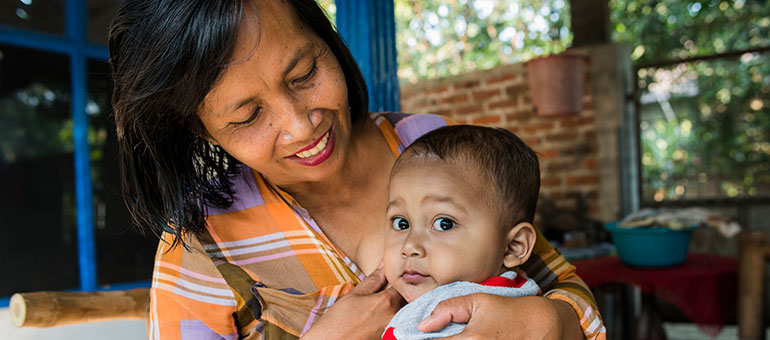This week GAIN is celebrating World Breastfeeding Week by emphasizing the importance of breastfeeding as a pillar for the healthy growth and development of children in their first two years.
Breastfeeding is a proven nutrition intervention that helps children reach their full potential later in life, and plays a key role in improving the health and empowerment of mothers. The theme of this year’s WBW, coordinated by the World Alliance for Breastfeeding Action (WABA), revolves around the Sustainable Development Goals, particularly in the areas of nutrition/food security, health and wellbeing, work productivity and empowerment.
Here are 5 steps in the right direction towards engaging a wider range of actors in promoting breastfeeding (and therefore rejecting infant formula or milk substitutes) which we would like to highlight in celebration of this year’s World Breastfeeding Week:
1.World Health Assembly resolutions further protect breastfeeding up to 2 years and beyond
Thirty-five years after the adoption of the International Code of Marketing of Breast Milk Substitutes (the Code) by the World Health Assembly, a new resolution was passed at the 69th Assembly in May 2016 on “Guidance on ending the inappropriate promotion of foods for infants and young children”. The resolution aims to strengthen regulation of marketing of follow-on formula or growing-up milks targeting children of 6 months to 3 years in a similar way as infant formula marketed for children 0 to 6-months. This measure, which countries are encouraged to adopt into their national policy and regulatory framework, adds further protection to continued breastfeeding up to 2 years.
The Assembly officially adopted a resolution in response to the recently launched UN Decade of Action on Nutrition from 2016 to 2025, which urges member states to increase political commitment to and investment in breastfeeding as the cornerstone of child nutrition, health and development.
GAIN supports both resolutions and, in a public statement at the WHA, emphasised the importance of adopting a multi-sectoral, interdisciplinary approach crucial to tackle both under and over nutrition for future generations.

A mother breastfeeding her baby in Indonesia. © GAIN
2. Monitoring the status of national laws to protect and promote breastfeeding
This year, the World Health Organization (WHO), UNICEF and The International Baby Food Action Network (IBFAN) also launched the first ever joint global report providing an overview of how the Code is being legally implemented in 194 countries around the world, holding governments and stakeholders accountable to their commitments as members of the WHO. More countries have passed laws to protect and promote breastfeeding since 2011, however the quality and substance of these legal measures varies significantly between countries. The report shows that higher-income countries lag behind lower-income ones and among the 135 countries that have any laws on marketing of breast-milk substitutes, just over half sufficiently prohibit advertising and promotion of breastmilk substitutes. Monitoring these laws will encourage more countries to enforce existing legislation and effectively promote optimal breastfeeding practices.
3. Measuring Code compliance by food and beverage manufacturers
In a similar vein, this year the Access to Nutrition Index (ATNI), which ranks the world’s largest food and non-alcoholic beverage manufacturers according to various nutrition criterion, have adapted its methodology to evaluate companies’ compliance with the International Code. An indicator weighing 50% has been added to existing criteria that relate to the Code, for example around responsible marketing, support for healthy diets, product labelling and health & nutrition claims. Altogether these indicators form 13% of the overall score for companies that manufacture breastmilk substitutes, namely Danone, FrieslandCampina, Groupe Lactalis, Heinz and Nestlé. This will be an important framework to holding companies accountable to code compliance and breastmilk protection.
4. Growing support for breastfeeding in the workplace
Under the SUN Business Network (SBN), co-chaired by GAIN and World Food Program (WFP), a growing number of global and local companies have made commitments to improve workplace friendly policies for their employees. Since 2013, 30 workplace commitments have been made by SBN members, some of which specifically include maternity support, reaching 1.2 million people from 2013-2020. At the global level, companies like Barclays, BASF, Ajinomoto, Gallup and two Indonesian companies, Indofood and Otsuka, have specifically made commitments to improve their workplace policies for breastfeeding mothers. Enabling pro-breastfeeding interventions and policies for women in the workplace is a positive step towards supporting their role as both mothers and contributors to the workforce.
Together with Business for Social Responsibility (BSR), GAIN has also taken steps to promoting breastfeeding in the workplace. In Bangladesh, female workers in garment factories are provided with counselling on breastfeeding and infant and young child feeding. Four factories have set up small private spaces to enable mothers to breastfeed their children during the day.
5. Promoting breastfeeding among mothers, while discouraging use of infant formula in Indonesia
Most mothers are able to recall the message ‘Breast is best’ as promotion of breastfeeding is a key element of nutrition behaviour change interventions. Yet, the practice may not follow. In Indonesia, through formative research with the London School of Hygiene and Tropical Medicine (LSHTM), GAIN has found that while mothers know that breast is best, most mothers are not confident about their body’s ability to produce enough, and feel that they make it perfect by topping up the breast milk, with formula milk.
A large part of the Ministry of Health (MoH) - endorsed "Rumpi Sehat" ("Healthy Gossip") campaign that GAIN developed has been dedicated to addressing just that. The TV advert "Breast is enough" includes key visuals that toss out the bottle with infant formula because that it inhibits mothers’ ability to produce enough breastmilk. Last year our breastfeeding week campaign on Facebook went viral in Indonesia, with over 90,000 views and clicks on images and videos meaning that mothers are responsive to this message.